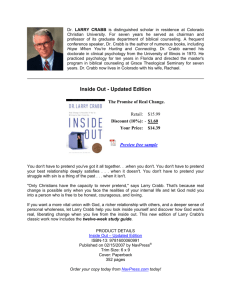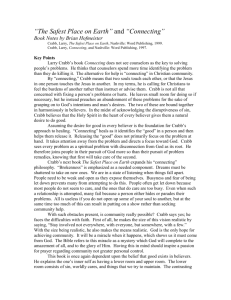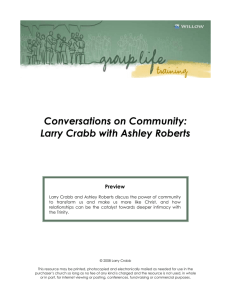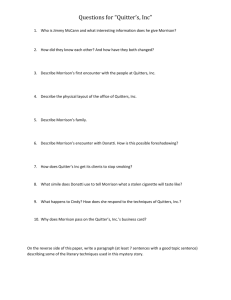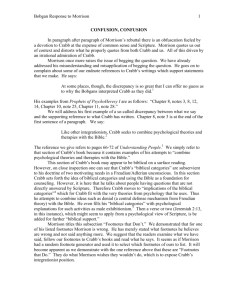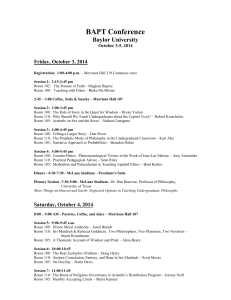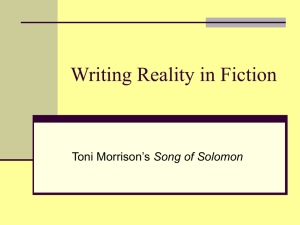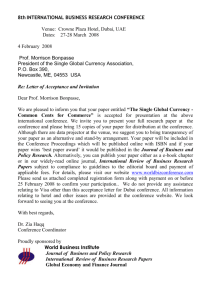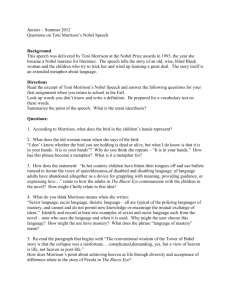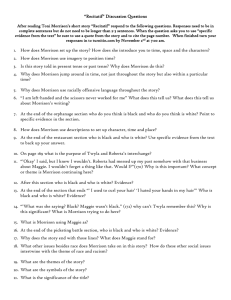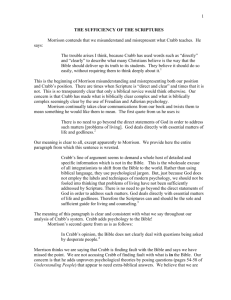Bobgan Response to Morrison 1 “NEED” THEOLOGY Morrison's
advertisement
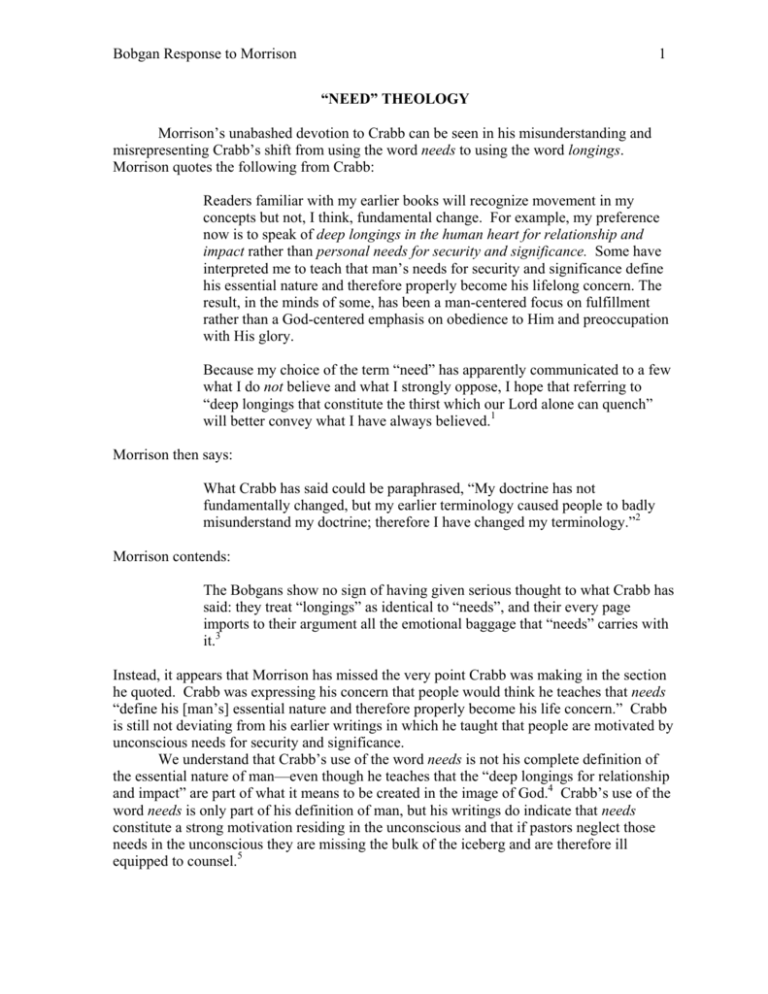
Bobgan Response to Morrison 1 “NEED” THEOLOGY Morrison’s unabashed devotion to Crabb can be seen in his misunderstanding and misrepresenting Crabb’s shift from using the word needs to using the word longings. Morrison quotes the following from Crabb: Readers familiar with my earlier books will recognize movement in my concepts but not, I think, fundamental change. For example, my preference now is to speak of deep longings in the human heart for relationship and impact rather than personal needs for security and significance. Some have interpreted me to teach that man’s needs for security and significance define his essential nature and therefore properly become his lifelong concern. The result, in the minds of some, has been a man-centered focus on fulfillment rather than a God-centered emphasis on obedience to Him and preoccupation with His glory. Because my choice of the term “need” has apparently communicated to a few what I do not believe and what I strongly oppose, I hope that referring to “deep longings that constitute the thirst which our Lord alone can quench” will better convey what I have always believed.1 Morrison then says: What Crabb has said could be paraphrased, “My doctrine has not fundamentally changed, but my earlier terminology caused people to badly misunderstand my doctrine; therefore I have changed my terminology.”2 Morrison contends: The Bobgans show no sign of having given serious thought to what Crabb has said: they treat “longings” as identical to “needs”, and their every page imports to their argument all the emotional baggage that “needs” carries with it.3 Instead, it appears that Morrison has missed the very point Crabb was making in the section he quoted. Crabb was expressing his concern that people would think he teaches that needs “define his [man’s] essential nature and therefore properly become his life concern.” Crabb is still not deviating from his earlier writings in which he taught that people are motivated by unconscious needs for security and significance. We understand that Crabb’s use of the word needs is not his complete definition of the essential nature of man—even though he teaches that the “deep longings for relationship and impact” are part of what it means to be created in the image of God.4 Crabb’s use of the word needs is only part of his definition of man, but his writings do indicate that needs constitute a strong motivation residing in the unconscious and that if pastors neglect those needs in the unconscious they are missing the bulk of the iceberg and are therefore ill equipped to counsel.5 Bobgan Response to Morrison 2 We also understand that Crabb is not teaching that needs become a person’s “life concern.” However, Crabb is teaching need psychology and an emphasis on the unconscious and its needy contents. Whether Crabb intends it or not, his kind of psychology does encourage a man-centered self focus. And, we also understand that Crabb would not want Christians to assume that every aspect of humanistic psychology is intrinsic to his system. For instance, he would disagree with one of the foundations of humanistic psychology—that man is born good. Nevertheless, Crabb does incorporate a good deal from humanistic psychology, including the basics of need psychology. The focus of our criticism remains the same—Crabb’s doctrine has not fundamentally changed. On that fact we are in agreement with Morrison and Crabb. If Crabb’s earlier terms security and significance represent the same doctrine as his later terms relationship and impact (we all agree on this), then the terms are equivalent. This is a simple, basic form of reasoning that escapes Morrison. Is this ignorance on his part? No. Is this dishonesty on his part? We don’t think so. We think it is further evidence of the blind devotion that Morrison pays to Crabb. Even our simplest, most obvious reasoning escaped Morrison for fear his idol might be wrong in even one instance. Morrison’s argument does not refute what we say; it distorts it. In ignoring what we say, distorting what Crabb says, and coming to an illogical confusion that doesn’t fit the facts, Morrison further exposes his unwillingness to objectively read Crabb, to fairly represent what we say, and to use common sense. Morrison states one of his central tenants of support for Crabb as follows: Crabb’s doctrines of man and of change are grounded in the Bible and his model does not “borrow” from humanistic psychology, so the entire section is irrelevant to any objective critique of his work.6 Morrison dogmatically declares that Crabb’s doctrines are “grounded in the Bible” and that Crabb’s model “does not ‘borrow’ from humanistic psychology.” Morrison supplies no adequate support for his assertion, no systematic analysis of Crabb’s model of man or methodology of change. In fact, he admits that he does not even include a “systematic summary of Crabb’s thought.”7 Thus Morrison would have us believe what he says because he says so. Morrison’s declaration that Crabb’s doctrines are “grounded in the Bible” and that Crabb’s model “does not ‘borrow’ from humanistic psychology” constitutes a false presentation of Crabb’s position. Morrison refuses to recognize that if one were to delete a Freudian/Adlerian unconscious from Crabb’s system, it would collapse. We have carefully analyzed Crabb’s model in Prophets of PsychoHeresy I to reveal the psychological foundations for Crabb’s counseling model and methodology. One would have to be ignorant of those psychological theories not to see them. Crabb’s methodology is dependent upon an unconscious that is filled with motivational material that drives behavior. Rather than repeating our systematic analysis of Crabb’s system here, we suggest the reader refer to Prophets of PsychoHeresy I. Crabb is more open and direct in his early books concerning his heavy dependence upon humanistic psychology. However, because people criticized him for his integration of psychology with Scripture, he changed his vocabulary. Yet, his later books are just as dependent as his early books, because the same psychological presuppositions have colored his system. He has attempted to make his counseling model more biblical through the Bobgan Response to Morrison 3 language he uses, but the heavy influence of the very psychologies he admits to using in his early books continues throughout Understanding People and Inside Out. It may be that Morrison is totally ignorant of Freudian, Adlerian, and humanistic psychology and/or totally unwilling to apply common sense to the situation. The result is just another higgledy piggledy. We agree with Morrison’s final statement in this section: All lies proceed from the father of lies. They do not become true just because they pass through the hands of born again Christians en route.8 Disregarding what Crabb says and contrary to what we say, Morrison has presented to his readers a fallacious bunch of information in hopes of rallying support for his hero and encouraging antagonism towards us. Only blind devotion could have entrapped a seemingly earnest person to such abandonment of truth. 1 2 3 4 5 6 7 8 Lawrence J. Crabb, Jr.. Understanding People (Grand Rapids, MI: Zondervan Publishing House, 1987), pp. 15-16. Trevor Morrison, “Misunderstanding People,” unpublished paper, p. 9. Ibid., p. 9. Crabb, op. cit., pp. 93-95. Ibid., p. 129. Morrison, op. cit, p. 10. Ibid., p. 1. Ibid., p. 10. Next: Karl Popper and the Philosophy of Science Return to: Contents
